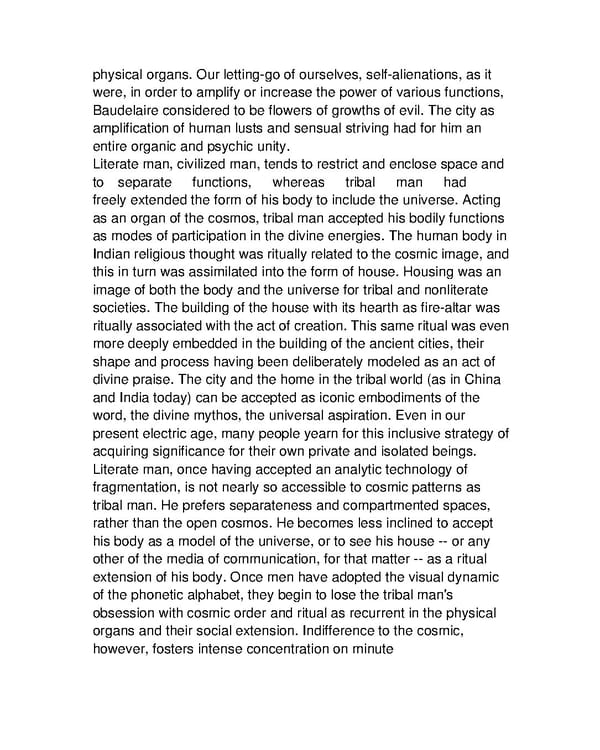physical organs. Our letting-go of ourselves, self-alienations, as it were, in order to amplify or increase the power of various functions, Baudelaire considered to be flowers of growths of evil. The city as amplification of human lusts and sensual striving had for him an entire organic and psychic unity. Literate man, civilized man, tends to restrict and enclose space and to separate functions, whereas tribal man had freely extended the form of his body to include the universe. Acting as an organ of the cosmos, tribal man accepted his bodily functions as modes of participation in the divine energies. The human body in Indian religious thought was ritually related to the cosmic image, and this in turn was assimilated into the form of house. Housing was an image of both the body and the universe for tribal and nonliterate societies. The building of the house with its hearth as fire-altar was ritually associated with the act of creation. This same ritual was even more deeply embedded in the building of the ancient cities, their shape and process having been deliberately modeled as an act of divine praise. The city and the home in the tribal world (as in China and India today) can be accepted as iconic embodiments of the word, the divine mythos, the universal aspiration. Even in our present electric age, many people yearn for this inclusive strategy of acquiring significance for their own private and isolated beings. Literate man, once having accepted an analytic technology of fragmentation, is not nearly so accessible to cosmic patterns as tribal man. He prefers separateness and compartmented spaces, rather than the open cosmos. He becomes less inclined to accept his body as a model of the universe, or to see his house -- or any other of the media of communication, for that matter -- as a ritual extension of his body. Once men have adopted the visual dynamic of the phonetic alphabet, they begin to lose the tribal man's obsession with cosmic order and ritual as recurrent in the physical organs and their social extension. Indifference to the cosmic, however, fosters intense concentration on minute
 Understanding Media by Marshall McLuhan Page 138 Page 140
Understanding Media by Marshall McLuhan Page 138 Page 140